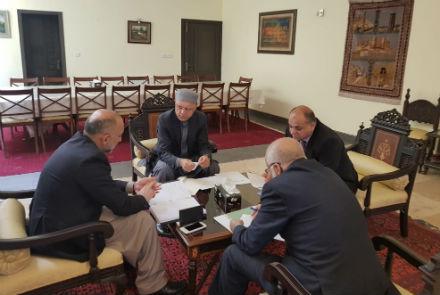A high-level Afghan security delegation led by National Security Advisor Mohammad Hanif Atmar arrived in Pakistan on Sunday where they will hold discussions with Pakistani officials on a number of key issues pertaining to Afghanistan’s security, the war on terrorism, mutual cooperation and regional issues.
“Assigned by H.E.Pres. Ghani, led by NSA MH Atmar, a high ranking security delegation travelled to Pak. today to discuss the implementation of the Afg-Pak Action Plan for Peace&Solidarity (APAPPS) both side will have detail discussions on Peace&Counterterrorism,®ional issues,” Atmar tweeted.
“The trip is taking place at the official invitation of his excellency Shahid Khaqan Abbasi, the prime minister of Pakistan, who had requested the president of the Islamic Republic of Afghanistan dispatch a high-level delegation to hold talks on security issues related to Afghanistan and Pakistan and the region,” Atmar’s office said in a statement on Sunday.
The trip also aims to hold high level negotiations on Afghanistan-Pakistan Action Plan for Peace and Solidarity (APAPPS), read the statement.
“Within the framework of this plan, high level security officials from both countries will hold discussions on practical steps about fighting terrorism and boosting peace,” read the statement.
Atmar is accompanied by Afghan Minister of Interior Wais Ahmad Barmak and head of the National Directorate of Security (NDS) Mohammad Masoom Stanekzai.
Amid accusations of Pakistan’s controversial role in the fight against terrorism, a number of lawmakers in Afghanistan’s parliament have said that the neighboring country has never pursued a sincere policy towards Afghanistan and that the trip will not deliver solid results.
MPs instead urged the international community to increase pressure on Pakistan to meet its anti-terror commitments.
The trip comes amid strained relations between Afghanistan and Pakistan.
Afghan officials have constantly accused Pakistan of harboring Taliban leaders providing sanctuaries to them to operate against Afghanistan.
Pakistan is also accused of launching deliberate missile attacks on Afghanistan’s eastern regions.
Pakistan and Afghanistan agreed to draw up a plan in April following Pakistan Prime Minister Shahid Khaqan Abbasi’s trip to Kabul where he held talks with Afghanistan’s President Ashraf Ghani. The two leaders agreed to seven key principles to finalize the action plan.
The two leaders agreed to the following:
* Pakistan to support the Afghan-led and Afghan-owned peace and reconciliation process,
* The two countries agree to undertake effective action against fugitives and irreconcilable elements posing security threats to either of the two countries,
* Both countries commit to denying the use of their respective territories by any country, network, group or individuals for anti-state activities against either country,
* To put in place a joint supervision, coordination and confirmation mechanism through Liaison Officers (LOs) for the realization of the agreed actions.
* The two countries commit to avoid territorial and aerial violations of each other’s territory,
* The two countries agree to avoid public blame games and instead use APAPPS cooperation mechanisms to respond to mutual issues of contention and concerns, and
* Establish Working Groups and necessary cooperation mechanisms as per APAPPS for full implementation of the APAPPS and the above, mutually reinforcing principles.


